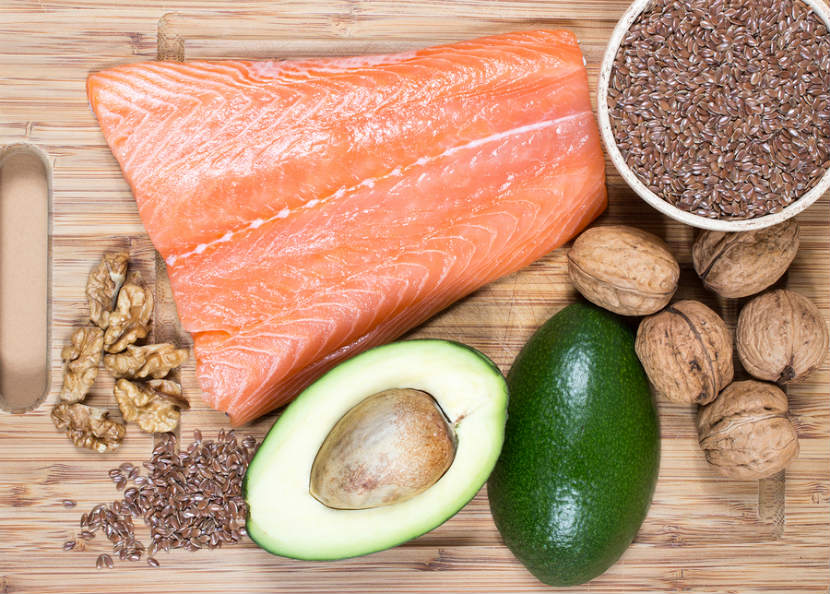
You have probably heard a lot about omega-3 fats. Omega-3 fats are essential fats and are an important part of a balanced diet. Read on to learn more about what foods have omega-3 fats and how to add them to your diet.
What are the health benefits of omega-3 fats?
Omega-3 fats have health benefits for adults and children. Omega-3 fats may help lower your risk of heart disease. In babies, omega-3 fats help with brain, nerve and eye development.
Omega-3 fats are considered essential as our bodies can’t make them on their own.
The three types of omega-3 fats are:
-
ALA (alpha-linolenic acid)
-
EPA (eicosapentaenoic acid)
-
DHA (docosahexaenoic acid)
All three types of omega-3 fats are important to have in your diet.
Tips for getting EPA and DHA
EPA and DHA are found in fresh, canned or frozen fatty fish like salmon, mackerel, anchovies, sardines, herring, Arctic Char and trout. Try the tips below:
-
Grill salmon for an easy and fast meal. Use a low sodium sauce, orange-ginger or lemon-dill for seasoning. Try Tea Poached Salmon with Fruit Salsa.
-
Use baked rainbow trout to make a wrap with romaine lettuce, grated cheese, a little mayonnaise and whole grain tortilla.
-
Use canned salmon to make a quick salmon quiche for dinner. Remember to mash the bones.
-
Try a twist on tuna salad. Add sliced grapes, diced apples and walnuts for extra crunch.
-
Broil herring with lemon and garlic.
-
Use anchovies or sardines as pizza toppings.
-
Try canned sardines as a snack with whole grain crackers.
How much fish should I eat to get the health benefits of omega-3 fats?
To get enough EPA and DHA, it is recommended to eat fatty fish at least twice per week.
Tips for getting ALA
ALA is found in foods like flax seeds, walnuts, soy products and omega-3 enriched products like eggs, milk and margarine. Very little of the omega-3 fat is absorbed from flax seeds because the seed is very hard to digest by the body. The body can absorb the omega-3 when the flaxseed is ground. Omega-3 fats are also found in vegetable oils like flax seed, canola and soybean oils.
Try the tips below:
-
Add ground flaxseeds to cereal, oatmeal and yogurt or add it to baked goods.
-
Add soybeans or tofu to stir fry dishes. Try Tofu Vegetable Soup or Sweet Chilli Tofu Stir-Fry.
-
Add walnuts to yogurt, salads or baked goods.
-
Replace regular eggs with omega-3 eggs. Make Stove-Top Broccoli and Mushroom Quiche with omega-3 eggs.
-
Use non-hydrogenated margarine made from canola or soybean oil on toast or when cooking or baking.
-
Use flaxseed, canola or soybean oil on salads or when cooking or baking.
-
Enjoy steamed edamame as a snack.
Fish and mercury facts
Eating fatty fish provides many health benefits. However, children and women who are pregnant, breastfeeding or may become pregnant should limit certain types of fish due to the higher levels of mercury that may be present. To learn more about fish and mercury, read Get the real scoop on fish and mercury.
Do other foods contain omega-3 fats?
Some foods in the grocery store now have added omega-3 fats. The amount of omega-3 fats in these foods varies. Including a variety of foods with added omega-3 fats will help increase your intake. However, fatty fish is the best source of omega-3 fats in your diet. Look for the words “omega-3,” “ALA,” “EPA,” or “DHA” on nutrition labels of foods like:
-
Eggs*
-
Margarine
-
Cow’s milk
-
Yogurt
-
Soy beverage
-
Bread
-
Cereal
*Note: If you have high cholesterol, diabetes or heart disease, read this article to find out how many eggs you can safely eat per week.
Should I take an omega-3 supplement?
If you are a vegetarian, vegan or simply don’t like the taste of fish, you may benefit from an omega-3 supplement. If you have high triglycerides, you may also benefit from an omega-3 supplement. Some supplements are made from algae oil and some from fish oil. The quality and amount of omega-3 fats in these supplements can vary widely. Look for supplements that have a Natural Product Number (NPN). The NPN ensures that the product has met the standards for quality, safety and efficacy set by Health Canada for Natural Health Products. The quality requirements include testing for chemical impurities such as heavy metals, pesticides and known contaminants.
Note: Fish liver oil supplements are not recommended.
Speak to your dietitian or health care professional before starting an omega-3 supplement. Your health professional will recommend the amount and type of omega-3 supplement that is right for you.
How can a dietitian help?
A dietitian can recommend personalized ways to increase your omega-3 intake to help meet your health goals. If you are vegetarian or vegan, or don’t like the taste of fish, a dietitian can help you make sure you are getting enough omega-3 from other sources. If needed, a dietitian can also recommend an omega-3 supplement that will work for you. Connect with a dietitian today!
Bottom line
Omega-3 fats may offer many health benefits including lowering the risk of heart disease and some cancers. Get all the health benefits of omega-3 fats by eating two servings of fish per week and adding omega-3 rich foods to your diet.
Speak to your healthcare professional if you are considering an omega-3 supplement. A healthcare professional can recommend the type and amount of omega-3 supplement that is right for you.
You may also be interested in:
Fish oil basics
Get the reel scoop on fish and mercury
All About Canned Salmon
What’s the Difference Between Farmed Salmon and Wild Salmon
This article was written and reviewed by dietitians from Dietitians of Canada. The advice in this article is intended as general information and should not replace advice given by your dietitian or healthcare provider.
Last Update – December 20, 2022